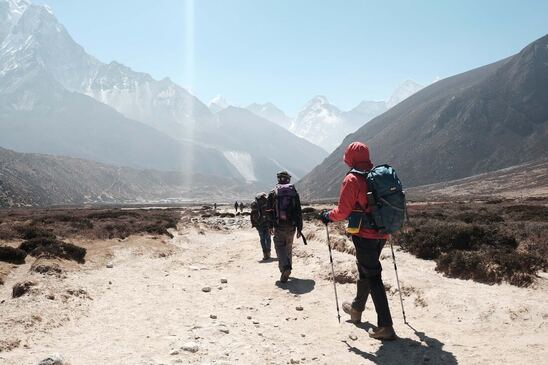|
Trekking at High Altitude is a whole different ball game to your usual hiking...and when you are in this unforgiving environment, your nutritional choices can contribute greatly to both your enjoyment and your chance of success. The single most important nutritional factor while at altitude is getting enough calories and fuel in. There is no question about that. But beyond this, the types of food you eat can significantly contribute to your performance on the mountain. In particular, carbohydrates play a number of important roles for a high altitude trekker. This article has been created to share a number of these potential benefits, and the science behind them, so you can have the knowledge to make the right choices while on the mountain. Note: by no means is this a definitive list. The world of altitude science is still incredibly misunderstood. Due to the difficulty and cost of organising studies in this environment, research does take time. And as with anything in the science world, our understanding of altitude is constantly growing and evolving. The following is a list of benefits which seem to be generally accepted in the research world, at this moment in time. It may change over time. It may be added to. But right now, the information shared below is a pretty safe bet. 6 Reasons Trekkers Should Eat Carbohydrates at High Altitude 1. Carbohydrates can reduce perceived exertion and improve physical performance at altitude Exercise at altitude can be tough! And you should be doing everything within your power to make this easier for you. Carbohydrate supplementation has been shown to reduce ratings of perceived exertion and improve physical performance at altitude, especially during prolonged or higher intensity exercise (1) In one study forty-one members of a 22-day high altitude expedition were given either a placebo or carbohydrate supplementation. When performing a mountaineering time trial at 5192m, individuals supplemented with carbohydrates reported 18% lower ratings of perceived exertion and competed it 17% faster then the placebo group. The benefit of that cannot be understated! 2. Carbohydrates may help improve ventilation at altitude Ventilatory changes are the single most important aspect of the acclimatistion process. It is generally accepted that an increase in the levels of carbon-dioxide in the blood will increase ventilation. When being metabolised, carbohydrates produce a larger amount of carbon-dioxide than the metabolism of either fats or protein. This chain of logic was seen to be significant in one study which showed ingestion of carbohydrates immediately before hypoxic exposure increased ventilation rates. This lead to a significant increase in haemoglobin oxygen saturation (2) Another study concluded that high carbohydrate diets are a feasible way of increasing ventilation and improving oxygenation when ambient oxygen was reduced (3) 3. Carbohydrates have been shown to positively effect arterial oxygen concentration at altitude. As you ascent to altitude your arterial oxygen concentration decreases. This is known to be associated with a reduction in VO2 max. (4) One study showed that a high carbohydrate meal consumer prior to moderate moderate exercise in hypoxia, reduced oxygen desaturation compared to a high-protein meal (5). In simple terms, this means there was more oxygen in the blood! 4. Carbohydrates are particularly important in cold environments. Most high altitude environments are cold. Making hypothermia a genuine concern. One of the bodies primary responses to low temperatures is shivering (to produce heat). While there is some contribution from fat, the bodies energy requirements for shivering is predominately fueled by carbohydrates (6) This means that adequate carbohydrate consumption is important to maintain body temperature at altitude. 5. Taste preferences can change at high altitude It is commonly believed that many peoples taste preferences can change at high altitude. Anecdotally, most climbers prefer a high-carbohydrate, low-fat diet at high altitude, with fatty foods actually becoming distasteful (7) * Considering that under-eating is a major concern at high altitude, ensuring that you have adequate supplies for this potential change in taste is important. *By no means is this is definitive statement. Individual variation will always play a part here. 6. High carbohydrate diets may help prevent some symptoms of altitude sickness. Altitude sickness is often the major concern for people going to altitude. And while genetics and rate of ascent are by far the biggest risk factors when it comes to altitude sickness, it has been suggested that a high carbohydrate diet may help prevent some of the symptoms of altitude sickness (8,9) However, to be clear, there is still plenty of debate around this. And this should not be considered a replacement for traditional strategies - such as controlled ascent or medications. A Word On Fat Adaptation The nutritional strategy of 'fat adaptation' is very popular in the endurance world. In brief, the idea behind it is that if you live and train in a carbohydrate restricted state, you can train your body to better utilise the huge amount of potential energy which is stored in your body fat. This is seen to be incredibly beneficial as it prevents you having to rely on carbohydrates (which the body can only store a small amount of at one time.) And while, if done right, this can be very beneficial in preparing for an altitude trek, this does not mean carbohydrates are not important! The key to this strategy is to apply in in your lower intensity training and preparation. But when it comes to performing on the mountain (or higher intensity exercise sessions), it is highly recommended you reintroduce carbohydrates. So you can take advantage of both sources of fuel and take advantage of the benefits described above. When you are trekking at high altitude, your nutritional choices play a significant role in your enjoyment, performance and chance of success. By concentrating on a high calorie, high carbohydrate diet you can aid your exercise performance, help muscle recover, protect against the cold and even potentially prevent some symptoms of altitude sickness.
|
AuthorRowan is a personal trainer who specialises in training for hiking, trekkers and mountaineers for their bucket list adventures. Archives
July 2024
Categories
All
|
AboutSummit Strength is a personal training for hiking service created specifically to help hikers have the best chance of a safe, enjoyable and successful adventure.
|
Company |
Services |
|
|
© COPYRIGHT 2018. ALL RIGHTS RESERVED.
|
Website Design by My Personal Trainer Website
|



 RSS Feed
RSS Feed
